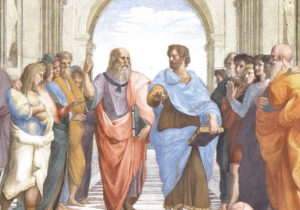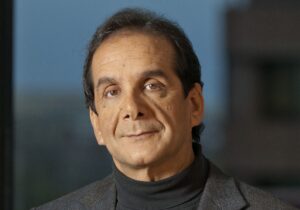What are we to make of France’s presidential election? More than anything, it points to the power of anti-systemic populism in French politics, whether on the Left or Right. For those who believe that a rules-based Western liberal order—with limited government, civil liberties, and a basic form of collective security among democracies—is crucial for world peace, France’s populism reminds us of the threats to democracy and Western solidarity. Too often those threats come from within democracies and threaten American values and interests.
Here is the latest from France. Current President Emmanuel Macron only received 27.8% of the vote in the first round of presidential voting. What is more telling is that the Far Right and Far Left populist candidates came in a close second and third with a combined total of over half the votes.
Marine Le Pen (23.1%) is the darling of the Far Right, the successor to her even more extreme father as leader of the National Front party, which in 2018 became known as the Rassemblement National (RN). Though she has tried to “detoxify” the party of her father, Jean Marie Le Pen, the party’s arguments have been “anti” rather than “pro”: anti-immigrant, anti-EU, anti-Paris, and, in the past, anti-Semitic. Today Marine Le Pen’s arguments focus on France, and French government services, for the native-born European French first, not the French Muslims, many of whom have lived in France for generations. She and her lieutenants have expressed considerable concern about the narrow divide between some Muslims and violent Islamism.
Jean-Luc Mélenchon (22%) has been a Socialist, a Communist, and now has his own political movement, France Unbound. He, too, is largely “anti”: anti-corporation, anti-capitalism, and anti-NATO. He pledges to dissolve the Fifth Republic (France’s current constitution) and write a new one. He pines for a party like Italy’s violent old Communists and recently called Russia a friend. What is Mélenchon for? The nationalization of some businesses, a green agenda, and massive social investment.
France is not the only country to see this populist trend in recent years, and it stems not from a neo-nativism, but, most of the time, from deep concerns that democracy itself is not performing well. This is true of Europe’s populist right-of-center parties, who have won elections in a few small countries such as Austria (population 7 million) and Hungary (population 10 million).
But far more concerning are the anti-religion, democracy-skeptical, left-of-center populist parties that won big elections in large-population European countries: Spain’s Podemos, Greece’s Syriza led by the firebrand Alex Tsipras, and Italy’s Five-Star Movement. In Latin America, much of the past decade bears the terrible legacy of radical leftist populism, most notably in Venezuela, Bolivia, and Nicaragua, which ruined their economies and flagrantly violated human rights. Many hoped that the departure of Hugo Chavez from the scene, a fading of the Castros as symbols of authoritarianism in Cuba, or the jailing of Brazil’s corrupt Luiz Inácio Lula da Silva would spell change. But Chavismo and the legacy of other populist leftist demagogues continue to resonate, and often spur a counter-reaction to right-of-center populists like Brazil’s Jair Bolsanaro, rather than to the political center.
Does this mean that Western publics have given up on democratic politics? No: the so-called populists, whether nationalists (right-leaning) or socialists (left-leaning), are typically organized around political parties and elected through democratic processes, thus representing the views of many citizens. The exceptions in Latin America seem to prove the rule. What was it that those citizens were concerned about? The answer is simple: a sense that their lives, livelihoods, and ways of life are eroding due to failing institutions, failing political structures, and elite disinterest. The populist sentiment is popular, and it rests on the presupposition that elites are out of touch with the daily needs and desires of common citizens.
Olivier Roy writes that right-leaning populist voices, such as Le Pen, point to generous benefits to non-citizens and policies that fail to assimilate immigrants and their children and grandchildren into Western values and democratic norms (e.g., the hijab vs. women’s rights). These groups often utilize historical and religious symbols to inform and mobilize supporters.[i] Left-leaning populists, including Bernie Sanders and Occupy Wall Street, argue that capitalist government policies and business elites are responsible for harming everyday folks by moving jobs and industries abroad and weakening social safety nets.[ii] Sociologist Jose Casanova rightly avoids the loaded term “populism,” instead labeling these movements “anti-systemic.”[iii]
Whether from the Right or the Left, these anti-systemic forms of representative populism are largely expressed through democratic means: speeches, articles, letters, political activism, parties, and elections. It becomes worrying when populist rabble-rousers challenge the rule of law and constitutional democracy, including calls for violence, as in Venezuela, Nicaragua, the anti-Wall Street movement, and other leftist populist movements. As scholars from the National Endowment of Democracy observe, there is a crisis of confidence, both in the developing world and across the West, that democracy is not performing as expected by protecting and promoting the livelihoods of its citizens.[iv] In France and elsewhere, the question is left unanswered as to whether the populace will choose to follow candidates who effectively want to degrade the rule of law, individual rights, and the existing social contract in favor of an idealistic new regime.
[i] Olivier Roy et al, Saving the People: How Populists Hijack Religion (Oxford: Oxford University Press, 2016).
[ii] Eric Patterson, “Religion, Populism, and Threats: Disentangling Risk, Responsibility, and the Ridiculous,” Observatoire International du Religieux, Bulletin No. 24 (Paris: Sciences-Po, December 2018), https://www.sciencespo.fr/ceri/fr/oir/conclusion.html.
[iii] Casanova pointed this out to me in a lengthy conversation in October 2018. For his well-known discussion of the intersection of religion and the public square, to include anti-systemic movements, see José Casanova, Public Religions in the Modern World (Chicago, IL: University of Chicago Press, 1994).
[iv] Marc F. Plattner, “Democracy Embattled,” in Journal of Democracy 31, no. 1 (2020); Larry Diamond, “Breaking Out of the Democratic Slump,” Journal of Democracy 31, no. 1 (2020).






